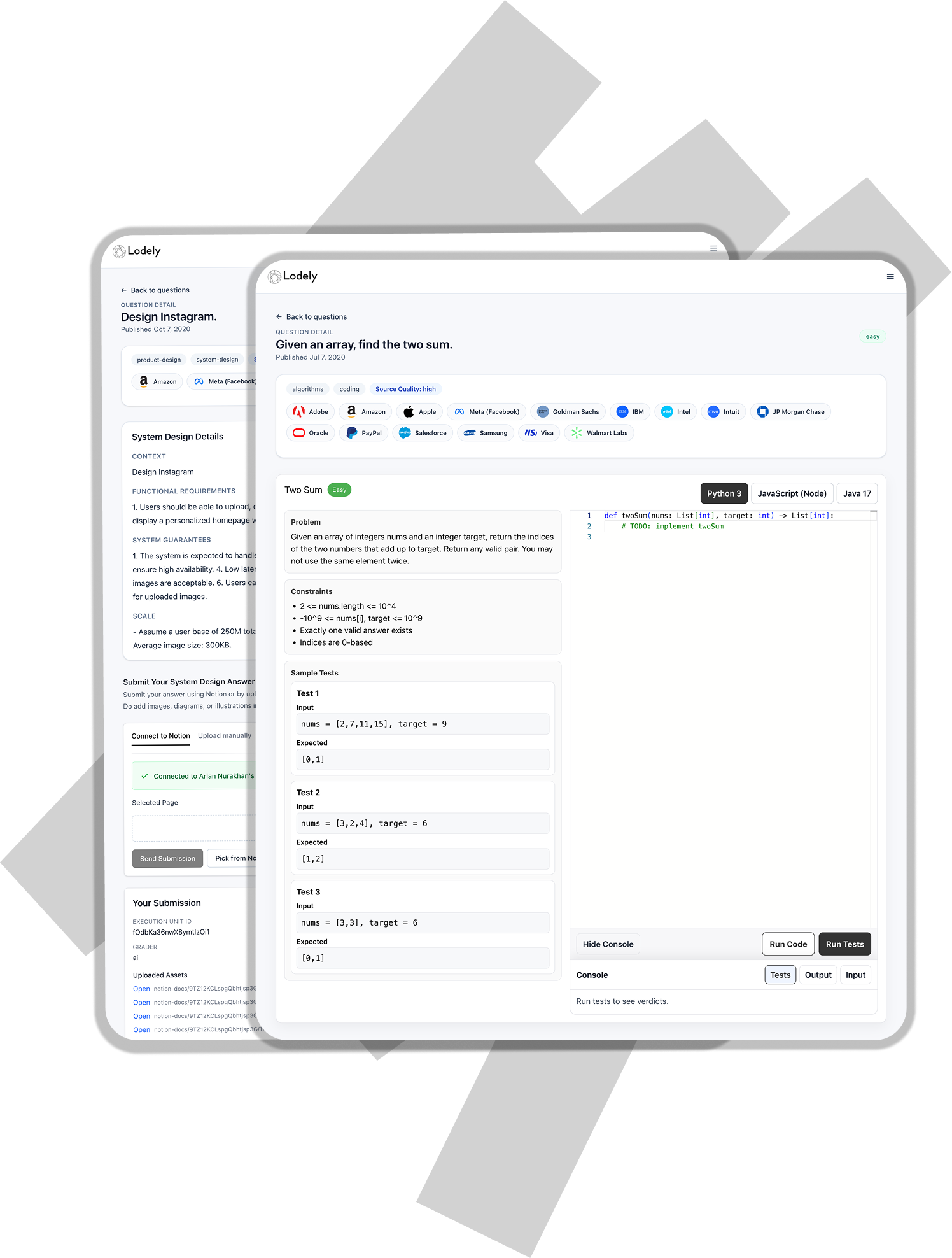How Long Does A Software Engineering Career Usually Last

How Long Does A Software Engineering Career Usually Last: Real Numbers, No Fluff
You’ve probably seen the memes: devs peaking at 25, burning out by 30, and retiring to run alpaca farms by 35. But real engineering careers? They don’t follow a script. Some evolve, some implode, and some quietly turn legendary.
So if you’ve ever wondered how long a software engineering career usually lasts, this guide breaks it down - no fluff, just real talk.
Software Engineering Career Length Analysis Based on Industry Data
This question comes up all the time in the engineering community. Whether it's at meetups, in Slack channels, or when talking to a software engineering career coach, everyone wants to know: "How long can I actually do this?"
The short answer? Way longer than you think. But let me break down the real numbers for you because there's a lot of BS floating around about this topic.
The Numbers Don't Lie: Your Career Can Last 25-35+ Years
Here's what the actual data tells us, not some random opinion from a forum:
Average Career Span: 25-35 Years
Most software engineers work for 25 to 35 years in the field. This isn't some made-up number - it's based on real industry data and patterns we're seeing across the board.
According to the 2024 Stack Overflow Developer Survey, which surveyed over 65,000 developers worldwide, 25% of professional developers have 1-4 years of experience, but here's the kicker - the survey shows developers distributed across all experience levels, with many having 10, 15, even 20+ years in the game.
The 2023 Stack Overflow survey was even clearer: 71% of respondents had been working for 14 or fewer years as professional developers, and 24% had worked 15 to 29 years. That's a quarter of developers with serious long-term careers.
When Do Most People Start?
Typical entry age is 21-25, right after college or a coding bootcamp. Some people get in earlier (I know folks who started at 18), others make career switches in their 30s or even 40s. The beauty of this field is that it's skill-based, not age-based.
When Do People Actually "Retire"?
This is where it gets interesting. Most engineers don't follow traditional retirement patterns:
- Early transition/retirement: 50-60 years old. This is super common in tech because of the financial upside
- Traditional retirement: 62-67. Some stick around for the standard retirement age
- Keep going past 65: Yeah, this happens more than you'd think, especially in specialized areas
But here's the thing - many don't actually "retire" from engineering. They transition into different roles within tech or start their own companies.
Career Longevity Breakdown by Role Type
Not all engineering roles age the same way. Here's what I've observed:
Individual Contributor (IC) Coding Roles
Most individual contributors find their sweet spot around the 10-20 year mark. This doesn't mean you can't code past 20 years - it means most people choose to move into other areas. The constant technology churn can get exhausting, and honestly, the financial incentives often push you toward management or architecture roles.
Management and Architecture Tracks
Once you move into senior engineering management, lead engineer, or principal architect roles, your career longevity increases dramatically. Careers easily stretch to 35+ years in these positions. Your experience becomes an asset, not a liability. The skills you develop - system thinking, team leadership, technical strategy - these don't become obsolete.
The Real Reasons People Leave Early
Let me be honest about why some engineers exit before they have to:
Burnout (The Big One)
83% of software developers experience burnout according to recent studies. But here's what most people miss - burnout doesn't mean your career is over. It means you need to change something: your company, your role, or your approach to work-life balance.
Financial Independence
This is huge in our industry. Because software engineers can make serious money (we're talking $200K, $300K, $500K+ in total comp), many reach financial independence by their 40s or 50s. They don't have to work - they choose whether to work.
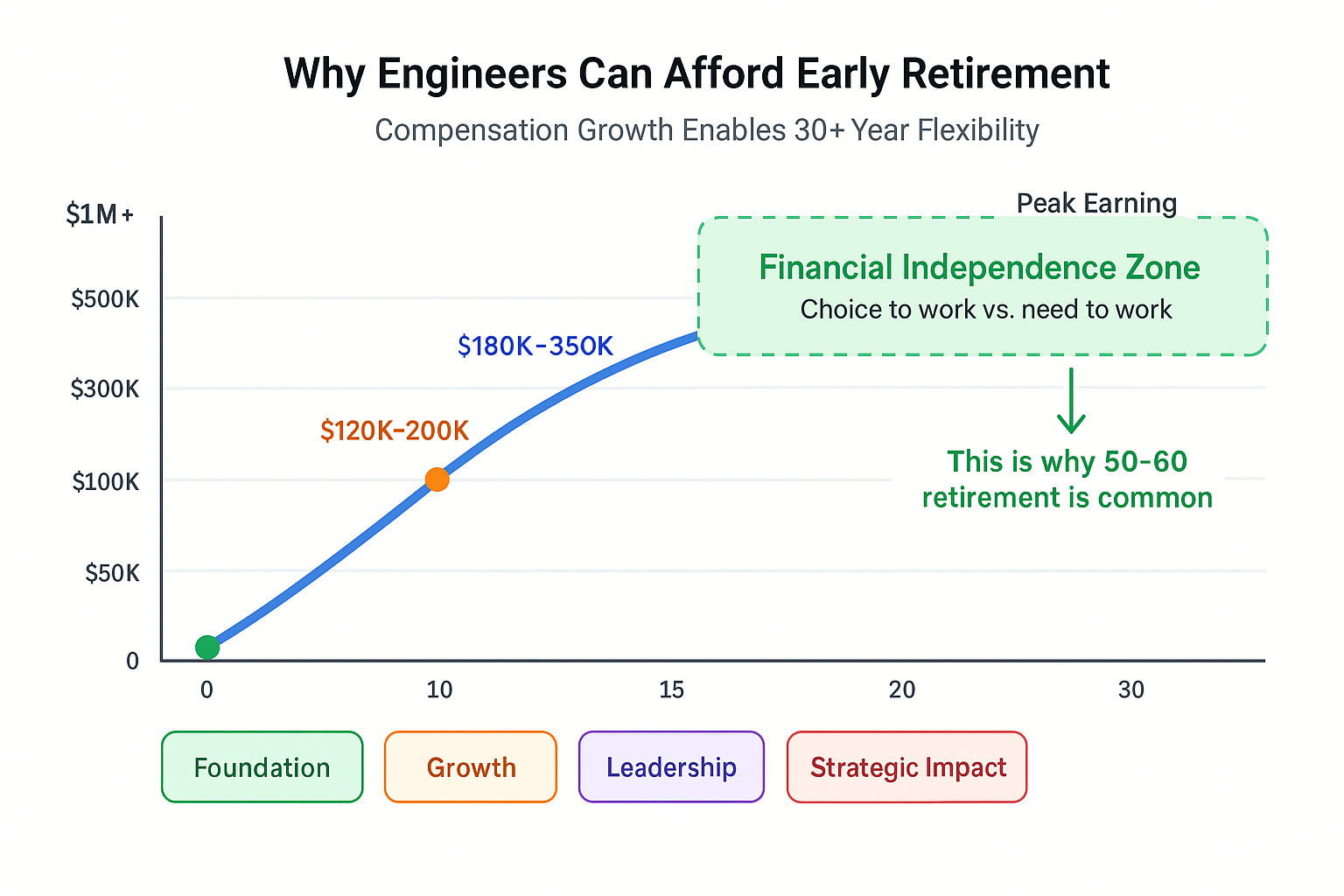
Career Pivots
Some people discover they're more interested in:
- Starting their own companies
- Moving into product management
- Teaching or writing
- Pursuing completely different interests
Technology Fatigue
Yeah, keeping up with the latest frameworks and tools can be exhausting. But here's the secret: you don't need to learn everything. Senior engineers focus on fundamentals and pick their battles.
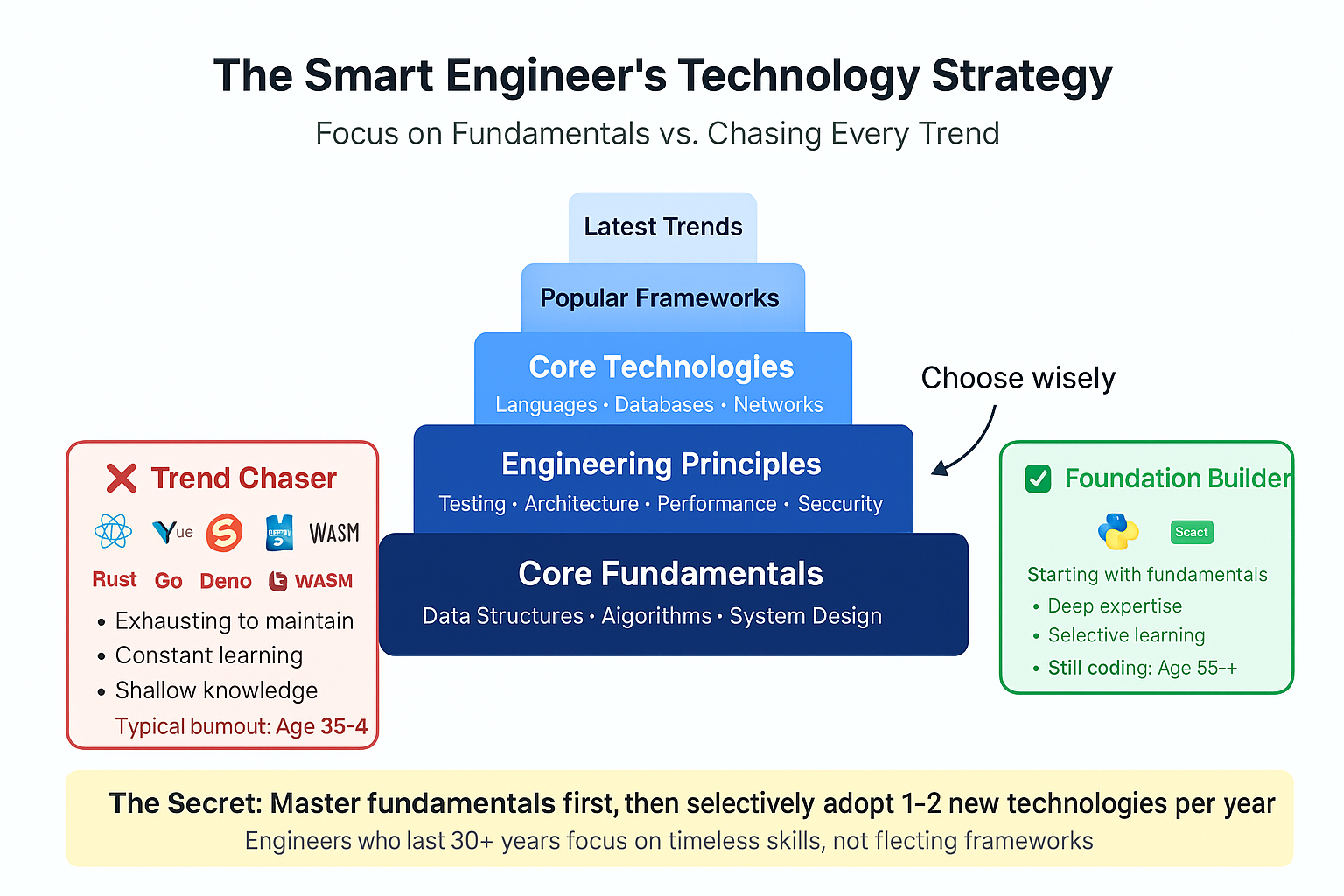
What Determines Your Career Length
Based on what I've seen across different companies and teams:
Learning Agility (Most Important)
Engineers who stay curious and adaptable have the longest careers. You don't need to be on the bleeding edge of every new technology, but you need to be willing to evolve.
Company Culture
This is massive. I've worked at places that worship youth and others that value experience. The company you choose can add or subtract years from your career.
Age-friendly companies tend to be:
- Enterprise software companies
- Financial services tech teams
- Government contractors
- Companies with strong engineering cultures (think Google, Microsoft, but also many smaller companies)
Passion vs. Paycheck
Engineers who genuinely love building things tend to stick around longer. If you're only in it for the money, you'll probably transition out once you've saved enough.
Health and Family Priorities
Let's be real, this job can be demanding. Engineers who figure out sustainable work practices early tend to have longer careers.
The Data Supporting Long Careers
The U.S. Bureau of Labor Statistics projects 17% growth for software developers from 2023 to 2033 - that's much faster than average for all occupations. They're not projecting this growth if they thought everyone would age out at 35.
The 2022 Stack Overflow survey showed that respondents from the United States and the United Kingdom had an average of 15+ years of coding experience. These aren't people who burned out early.
Your software engineering career can easily last 30+ years if you want it to. The key is evolution, not revolution. You don't need to chase every new JavaScript framework, but you do need to stay curious and adaptable.
Your 30-Year Software Engineering Career Map (What Happens Each Decade)
Here's the thing nobody tells you when you're starting out: your career isn't just about getting better at coding for 30 years. It's about evolving through completely different phases, each with its own challenges, rewards, and "aha" moments.
I've watched hundreds of engineers navigate these stages over the years, and there are some predictable patterns that can help you plan your next move. Let me break down what each phase looks like in practice.
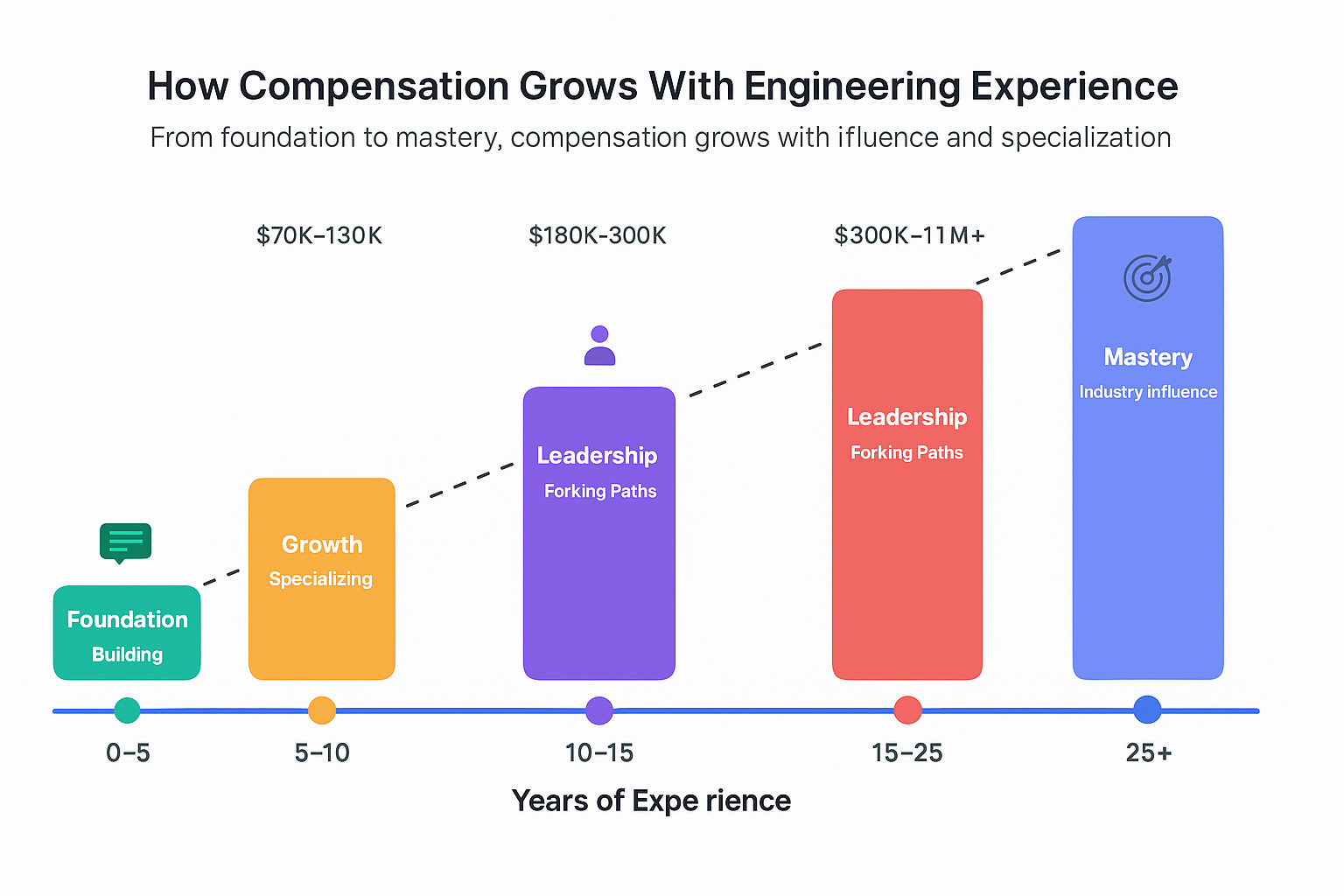
Years 0-5: Building Your Foundation (The Learning Sprint)
This is where everyone starts hungry and a little overwhelmed. You're absorbing everything like a sponge, making mistakes, and figuring out how this whole "professional software development" thing works.
What you're doing:
- Learning company processes - Git workflows, code reviews, deployment pipelines
- Building technical confidence - Getting comfortable with your stack, debugging skills
- Understanding business context - Why the code you write matters
- Developing work habits - Time management, communication, and asking for help
Career progression: Junior Developer → Mid-Level Engineer
Typical salary range: $70K-$130K (varies heavily by location and company type)
Real talk: Most people think this phase is just about learning to code better. Wrong. It's about learning to work. The engineers who thrive here are the ones who figure out how to translate business requirements into working software, not just the ones who memorize every JavaScript framework.
I remember one engineer who joined our team straight out of boot camp. Six months in, he wasn't the strongest coder, but he was the best at asking the right questions during planning meetings. Guess who got promoted first?
Years 5-10: The Specialization Decision (Pick Your Path)
This is where careers start diverging hard. You've got your fundamentals down, and now you need to decide: Do you want to go deep, go wide, or go up?
What you're doing:
- Leading smaller projects end-to-end
- Mentoring newer engineers (whether you want to or not)
- Making architecture decisions that affect multiple teams
- Specializing in specific domains - backend, frontend, mobile, infrastructure
Career progression: Senior Engineer → Staff Engineer OR Team Lead.
Typical salary range: $120K-$200K+ (equity starts mattering more)
The big realization: This is where you discover if you like engineering or if you like solving business problems. Some engineers double down on technical depth. Others start gravitating toward product discussions and team dynamics.
You won't believe how many folks I know who jumped into product management around year 7 after realizing they spent more time thinking about user problems than coding solutions. There's no shame in that pivot - some of the best PMs I work with are ex-engineers.
Pro tip: Pay attention to what energizes you during this phase. Do you get excited about optimizing database queries, or do you get excited about figuring out why users aren't converting? That tells you everything about your next decade.
Years 10-15: The Leadership Fork (Technical vs People Management)
Here's where the career paths split permanently. You're experienced enough to have opinions about everything, and companies want you to start influencing direction, not just following it.
Technical Leadership Track:
- Staff Engineer, Principal Engineer, Distinguished Engineer
- Technical architecture decisions across multiple teams
- Setting engineering standards and best practices
- Solving the hardest technical problems in the organization
People Management Track:
- Engineering Manager, Senior Engineering Manager
- Building and scaling teams
- Translating business goals into engineering roadmaps
- Developing other engineers and managing performance
Typical salary range: $180K-$350K+ (equity and bonuses become huge factors)
The reality check: Most engineers think management is just "engineering + people skills." It's not. Management is a completely different job that happens to require an engineering background. You're essentially becoming a translator between business needs and technical reality.
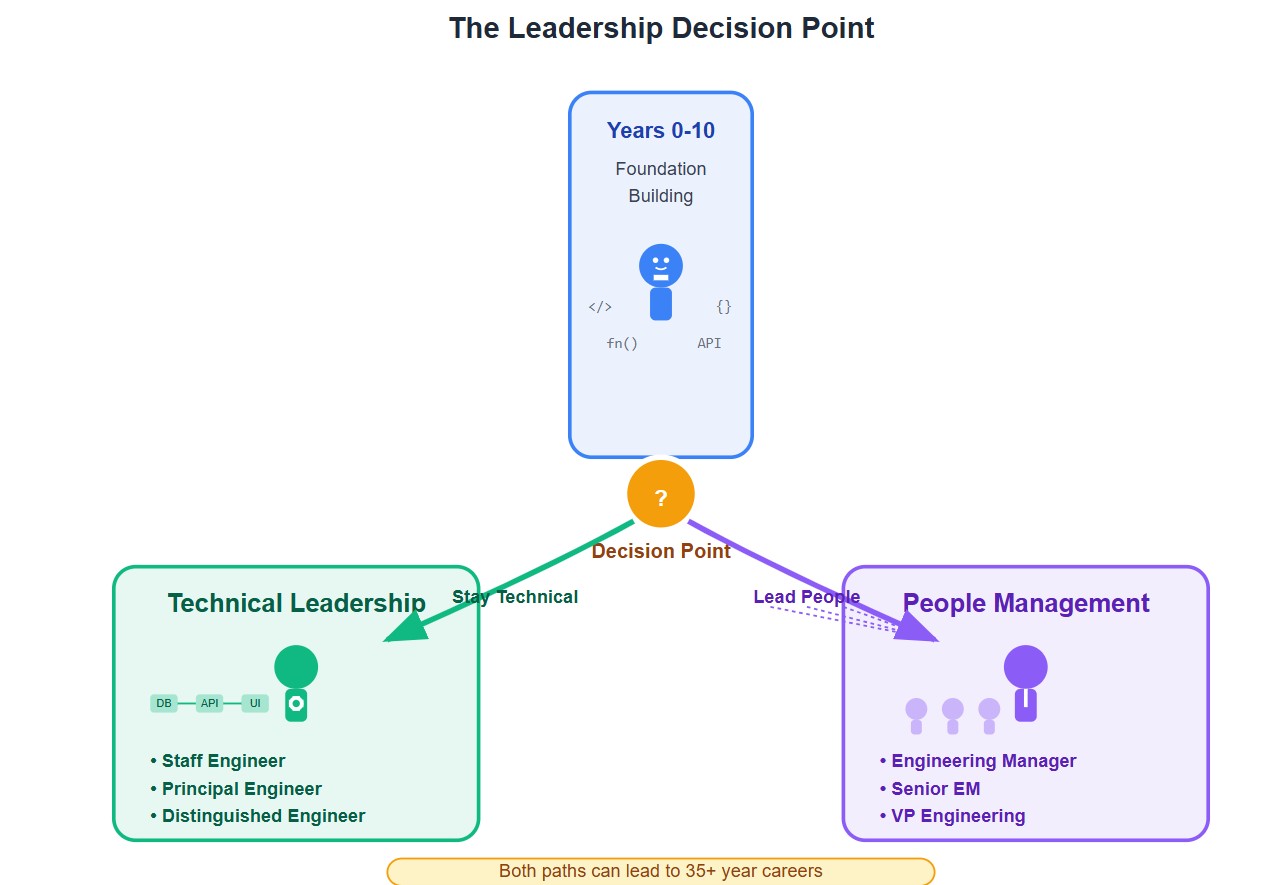
I've seen brilliant engineers flame out in management because they couldn't let go of being the person who solves all the technical problems. I've also seen decent engineers become incredible managers because they understood that their job shifted from writing code to enabling others to write better code.
The money conversation: This is where compensation gets interesting. Top individual contributors can out-earn managers at many companies, especially with equity. But managers often have more predictable comp and faster advancement to executive levels.
Years 15-25+: Strategic Impact (Industry Influence)
If you make it this far, you're not just building software anymore; you're shaping how software gets built. This is where you transition from executing strategy to setting strategy.
What this phase looks like:
- CTO, VP of Engineering, and Chief Architect roles
- Industry speaking and thought leadership
- Advising startups or joining boards
- Building engineering cultures from scratch
Alternative paths that open up:
- Technical consulting for multiple companies
- Startup founder leveraging 20+ years of domain expertise
- Investor or advisor helping other companies scale
- Teaching or writing about engineering at scale
Typical compensation: $300K-$1M+ (heavily equity-dependent)
The plot twist: Many engineers at this level work fewer hours than they did at 10 years of experience. Not because the work is easier, but because they've learned to work through other people and systems rather than grinding through problems themselves.
I know a former Facebook engineering director who now consults 3 days a week, makes more money than when he was full-time, and spends the other days building furniture. That's what 20 years of building the right network and reputation gets you.
Your career isn't a straight line of "getting better at programming." It's about evolving your impact from writing code to influencing how code gets written, who writes it, and what problems it solves.
Long Careers Are Less About Code and More About Clarity
The truth is, lasting in software engineering has less to do with the stack you master and more to do with how you evolve. The people who stick around aren’t chasing every trend - they’re the ones who adapt, shift roles, and stay clear on why they’re in the game. If you want your career to last, make clarity your edge.
Want to build a career that doesn’t burn out or stall out? Subscribe for straight-up advice on staying relevant, fulfilled, and in the game long term.
✉️ Get free system design pdf resource and interview tips weekly
✉️ Get free system design pdf resource and interview tips weekly

